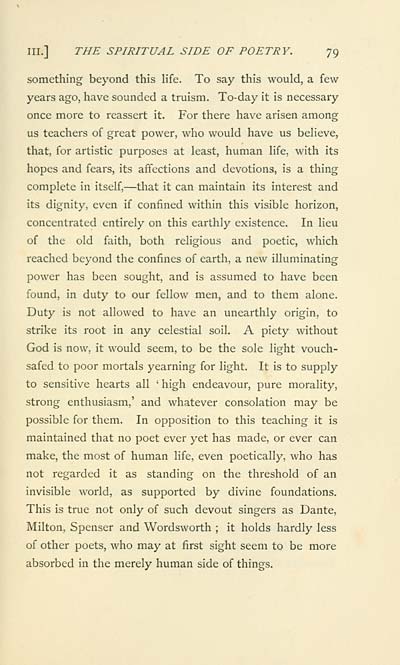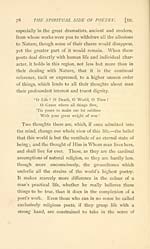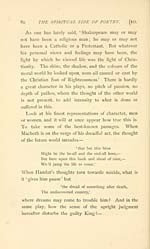Download files
Complete book:
Individual page:
Thumbnail gallery: Grid view | List view

III.] THE SPIRITUAL SIDE OF POETRY. 79
something beyond this life. To say this would, a few
years ago, have sounded a truism. To-day it is necessary
once more to reassert it. For there have arisen among
us teachers of great power, who would have us believe,
that, for artistic purposes at least, human life, with its
hopes and fears, its affections and devotions, is a thing
complete in itself, — that it can maintain its interest and
its dignity, even if confined within this visible horizon,
concentrated entirely on this earthly existence. In lieu
of the old faith, both religious and poetic, which
reached beyond the confines of earth, a new illuminating
power has been sought, and is assumed to have been
found, in duty to our fellow men, and to them alone.
Duty is not allowed to have an unearthly origin, to
strike its root in any celestial soil. A piety without
God is now, it would seem, to be the sole light vouch-
safed to poor mortals yearning for light. It is to supply
to sensitive hearts all ' high endeavour, pure morality,
strong enthusiasm,' and whatever consolation may be
possible for them. In opposition to this teaching it is
maintained that no poet ever yet has made, or ever can
make, the most of human life, even poetically, who has
not regarded it as standing on the threshold of an
invisible world, as supported by divine foundations.
This is true not only of such devout singers as Dante,
Milton, Spenser and Wordsworth ; it holds hardly less
of other poets, who may at first sight seem to be more
absorbed in the merely human side of things.
something beyond this life. To say this would, a few
years ago, have sounded a truism. To-day it is necessary
once more to reassert it. For there have arisen among
us teachers of great power, who would have us believe,
that, for artistic purposes at least, human life, with its
hopes and fears, its affections and devotions, is a thing
complete in itself, — that it can maintain its interest and
its dignity, even if confined within this visible horizon,
concentrated entirely on this earthly existence. In lieu
of the old faith, both religious and poetic, which
reached beyond the confines of earth, a new illuminating
power has been sought, and is assumed to have been
found, in duty to our fellow men, and to them alone.
Duty is not allowed to have an unearthly origin, to
strike its root in any celestial soil. A piety without
God is now, it would seem, to be the sole light vouch-
safed to poor mortals yearning for light. It is to supply
to sensitive hearts all ' high endeavour, pure morality,
strong enthusiasm,' and whatever consolation may be
possible for them. In opposition to this teaching it is
maintained that no poet ever yet has made, or ever can
make, the most of human life, even poetically, who has
not regarded it as standing on the threshold of an
invisible world, as supported by divine foundations.
This is true not only of such devout singers as Dante,
Milton, Spenser and Wordsworth ; it holds hardly less
of other poets, who may at first sight seem to be more
absorbed in the merely human side of things.
Set display mode to: Large image | Transcription
Images and transcriptions on this page, including medium image downloads, may be used under the Creative Commons Attribution 4.0 International Licence unless otherwise stated. ![]()
| Early Gaelic Book Collections > Ossian Collection > Aspects of poetry > (95) |
|---|
| Permanent URL | https://digital.nls.uk/78386412 |
|---|
| Description | Selected books from the Ossian Collection of 327 volumes, originally assembled by J. Norman Methven of Perth. Different editions and translations of James MacPherson's epic poem 'Ossian', some with a map of the 'Kingdom of Connor'. Also secondary material relating to Ossianic poetry and the Ossian controversy. |
|---|
| Description | Selected items from five 'Special and Named Printed Collections'. Includes books in Gaelic and other Celtic languages, works about the Gaels, their languages, literature, culture and history. |
|---|

